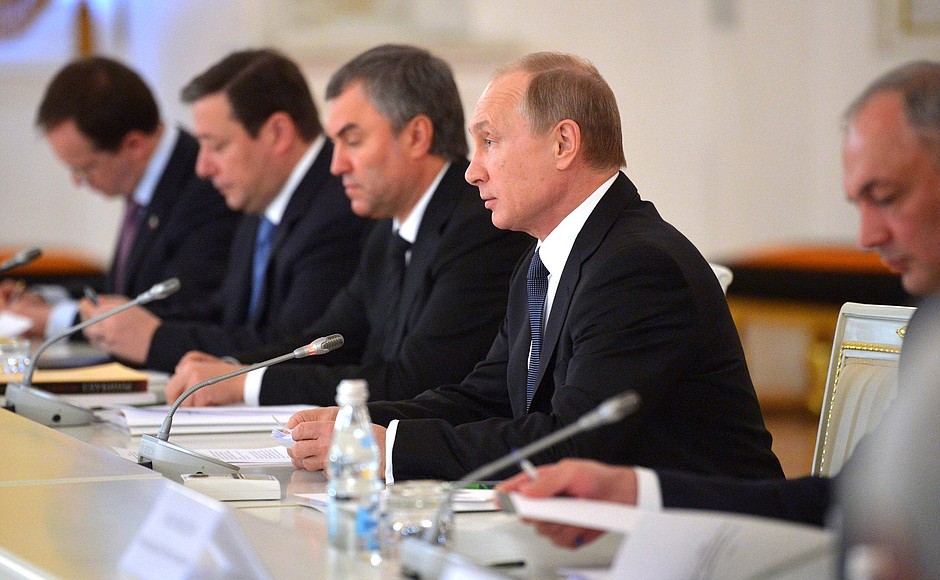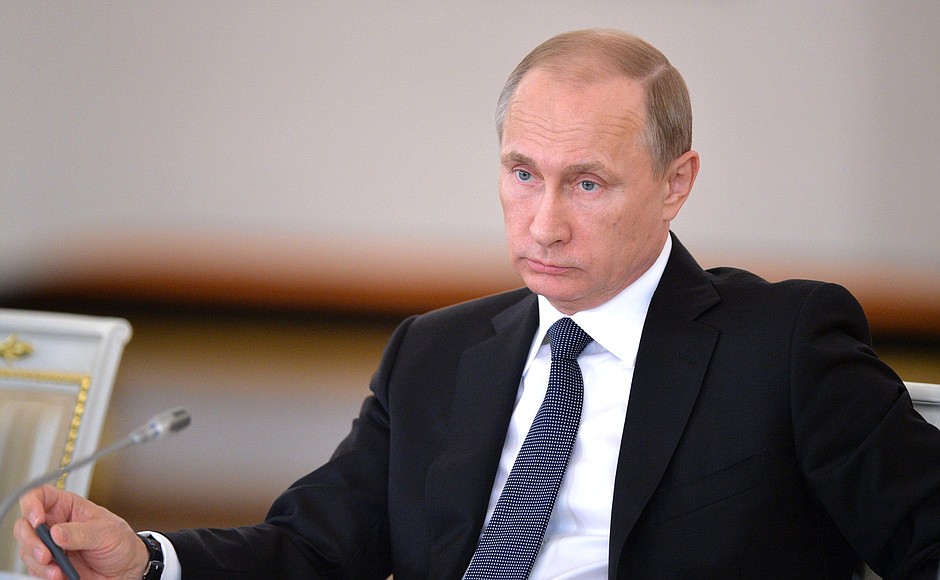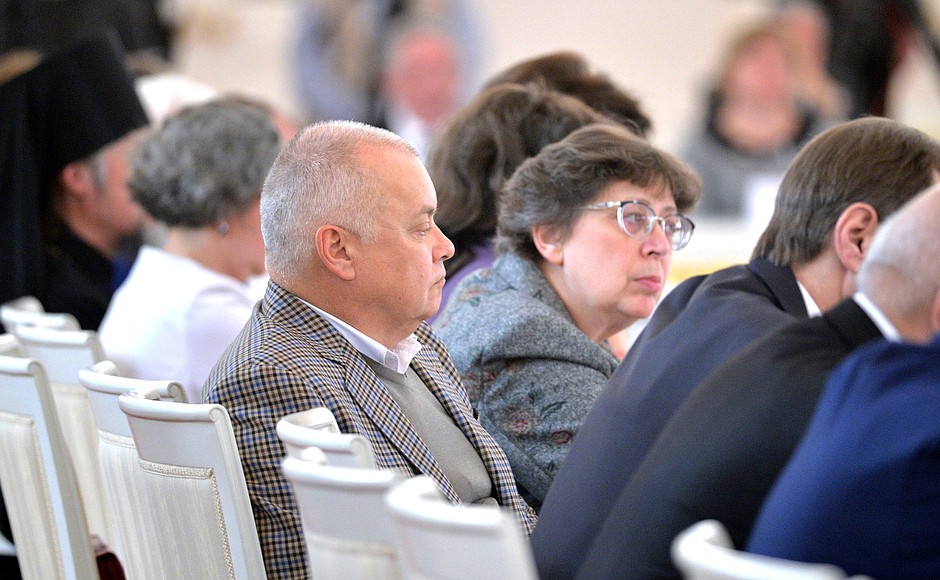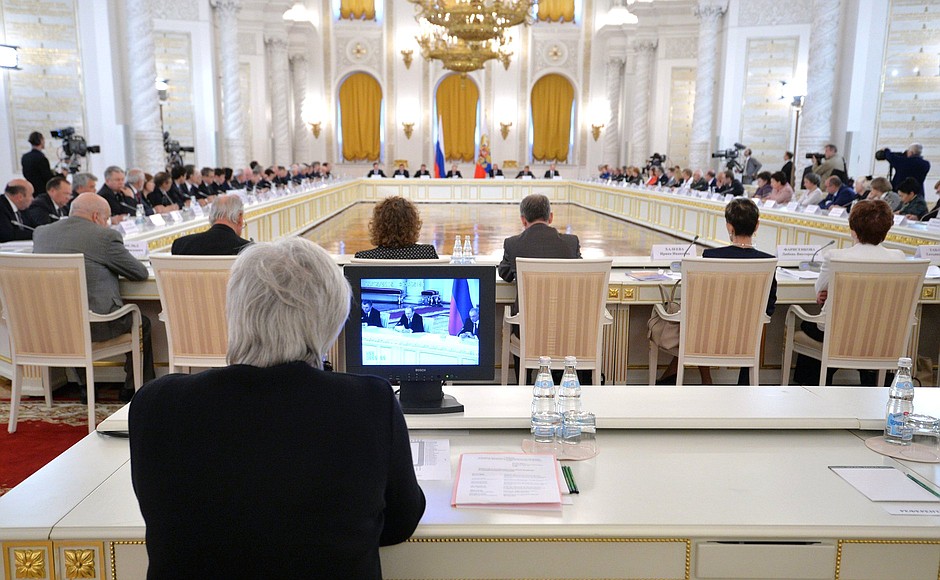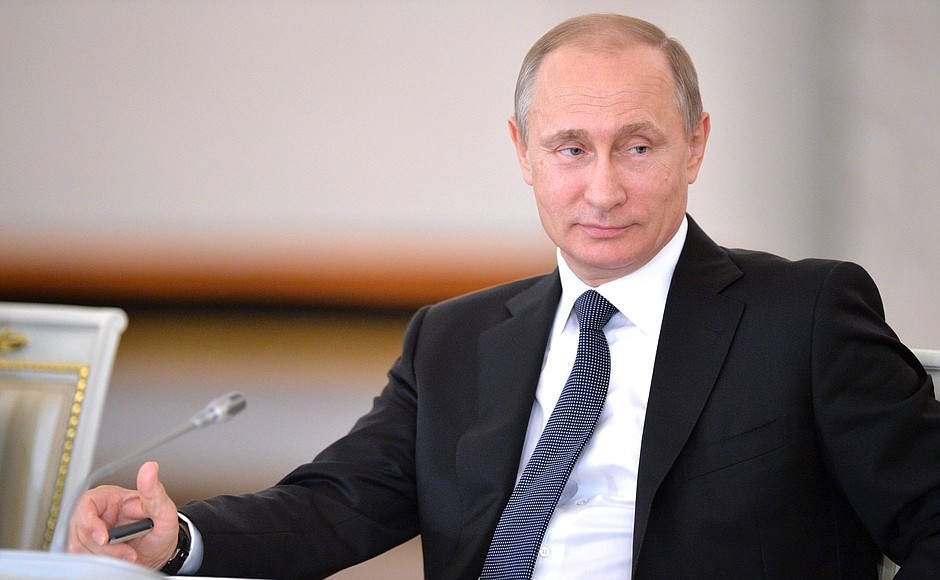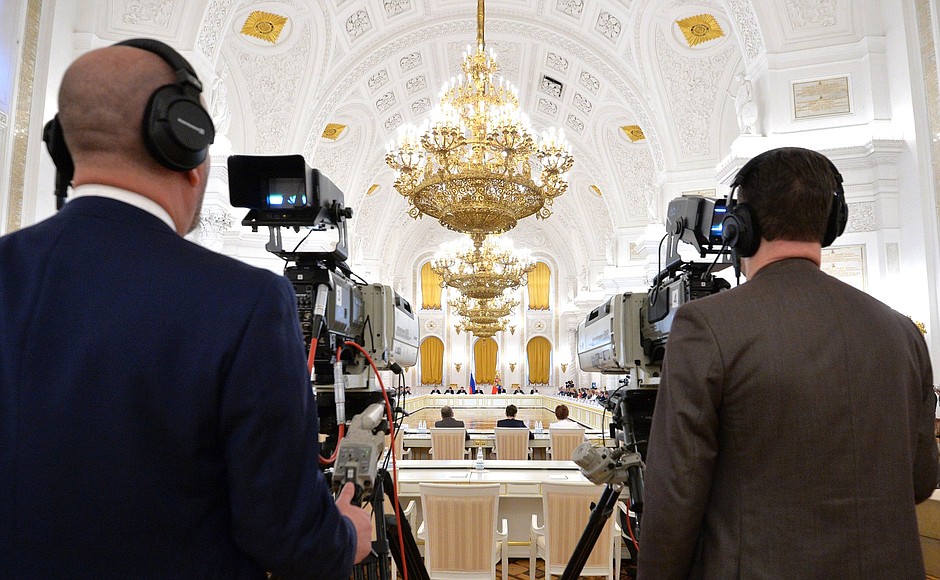The meeting focused on the role of the Russian language and the languages of Russia’s peoples in strengthening Russia’s statehood and ways to improve measures to preserve and develop Russia’s various languages.
* * *
President of Russia Vladimir Putin: Good afternoon, colleagues,
This is the first time we are holding a joint meeting of the Council for Interethnic Relations and the Council for the Russian Language. However, I am sure you would agree that this makes sense because the two councils have a number of similar or overlapping tasks that require interaction and coordination.
Among such system-related areas is a balanced and efficient language policy. For Russia with its ethnic and cultural diversity and complex national-state structure this is an obvious priority.
The preservation and development of the Russian language and the languages of all Russian ethnic groups and nationalities are of vital importance for ensuring harmony in interethnic relations and civic unity and for strengthening Russia’s national sovereignty and integrity.
This country is home to 193 ethnic groups and nationalities speaking almost 300 languages and dialects. I would like to note here that alphabets for many of these languages were only developed in Soviet times through the efforts of outstanding Russian linguists and philologists. In the 1920s-1940s, written languages were created for some 50 nationalities. They did not have them before.
I would also like to recall the tradition of translating into Russian books and poems initially written in the authors’ native tongue. The translations brought such works national and even international acclaim, like the works of Rasul Gamzatov, for instance.
It would be no exaggeration to say that the support and care languages enjoy in this country have never existed anywhere in the world.
I would like to add here that the Russian Constitution guarantees the right of all peoples to preserve their languages and to create conditions for their study and development. This includes the right of the republics to declare their own official languages and use them in the functioning of their bodies of power alongside Russia’s state language. Take Crimea: it has 3 equal languages – Russian, Ukrainian and Crimean Tatar.
However, we are aware of other countries that ignore or limit the right of significantly large ethnic groups to use their native language, that conduct a tough, aggressive policy of linguistic and cultural assimilation. We see what this may lead to: the division of society into ‘full-fledged’ citizens and ‘inferior’ ones, into ‘citizens’ and ‘non-citizens’ and even to outright tragic internal conflicts.
Colleagues,
For each one of us preserving our native language is equal to preserving one’s identity, distinctive character and traditions. Complex and comprehensive efforts to study and support the languages of the peoples of Russia should be continued. This includes fundamental and applied studies in this area and a deep scientific approach. This is the basis of a good education and a foundation for the promotion of national languages and cultures across the globe. I believe this could become a priority for the Russian Scientific Fund in allocating grants in the sphere of humanities, all the more so because language studies are in demand today.
Next. It is very important to further expand the multilingual educational and information space. This includes support for print and electronic media and publication of works of literature in the languages of Russia’s peoples.
We have to pay special attention to school education, where we use 89 languages, including 30 languages used as the language of tuition and 59 languages studied as subjects.
Children and their parents have the right to freely choose the language of tuition, which right is guaranteed by the Constitution. I would like to stress here that school administrations and regional authorities should guarantee this right.
At the same time, we have to understand that our informational, cultural and state unity, the unity of the Russian people directly depends on how well our young people master the Russian language, on its status and spread.
Russian is the country’s state language, the language of interethnic communication. More than 96 percent of our citizens speak Russian. It was the Russian language along with the Russian culture that formed Russia as a single multi-ethnic civilisation, for centuries maintaining ties between generations, the continuity and mutual enrichment of various ethnic cultures.
The ability to freely and properly use the Russian language opened up greater opportunities for representatives of any nationality in terms of using their potential, getting an education and achieving professional success. The state has to constantly improve the quality of Russian language teaching for our children regardless of where they live or what type of school they go to.
Here I fully agree with those experts – philologists, teachers and public figures – who say we should make the Russian language and Russian literature a separate subject in our system of general education. Currently, the Russian language and literature are only included in the general notion known as philology.
I am convinced that the Year of Literature, underway now, will give a serious impetus to the development of and support for the Russian language. We expect the planned events and programmes not only to revive interest in books and reading, but also become part of the systematic effort to enhance the overall level of language culture. Problems here, unfortunately, are evident not only in the results of the national final school exam (EGE) in the Russian language and literature, but in the overall state of the language environment.
It is now formed primarily by the media, the internet and television, where language norms and elementary grammar rules are being ignored ever more frequently and linguistic borrowings from other languages are used excessively, often without any obvious need.
True, there are certain rules that form the global information space, which, in turn, affects language – this is obvious. However, as we work on this, we need to ensure a strict balance between preserving traditional values and identity on the one hand and avoiding isolation from the global cultural processes on the other.
Colleagues,
In conclusion I would like to stress the following. Considering the role of language in the life of a people, a society, a state, we should rule out a departmentalised approach to developing and implementing the language policy. I suggest we consider today what the optimal model is, how to set the proper priorities and coordinate the efforts of the state, the regions and civic society in this area.
The corresponding sections of the implementation plans of the State Ethnic Policy Strategy and the federal targeted programmes, primarily such as The Culture of Russia, The Russian Language and Strengthening the Unity of the Russian Nation and Ethnic and Cultural Development of the Peoples of Russia, should be of the same interdepartmental, consolidated and substantive nature.
Another important thing is that our language policy is based on Constitutional norms and the laws On the Languages of the Peoples of the Russian Federation and On Official Language of the Russian Federation. The first was passed in 1991, the second – in 2005. Clearly, the issue of improving the legislative basis in this area is coming to the fore. I suggest we consider this as well.
However, we should do it all in a balanced way and with the broadest possible public discussion. Representatives of all Russia’s peoples should express their views and make their proposals.
Finally, I would like to note that language policy matters should be set among the priorities of the recently created Federal Agency for Ethnic Affairs. Its President Igor Barinov is here today. Mr Barinov, I would like you to carefully analyse all the decisions we make today and take them all into consideration.
Thank you.
<…>
Vladimir Putin: Colleagues,
I would like to thank you for your active participation in today’s discussion. I will not repeat things: you have managed to describe the importance of the topic we gathered here for in a very imaginative, colourful and detailed manner. It is extremely important for preserving our identity, unity and, so, the sovereignty of the Russian state. This means preserving our diversity and maintaining the status of the Russian language and the national languages of the Russian Federation. This is our true wealth.
It was mentioned here that unfortunately, as I have already said, there are not enough translations from the national languages. A lot needs to be done to make them stronger and to create the necessary basis. At the same time, we should not forget that Russian remains the only language of interethnic communication.
My colleague from Daghestan, former head of the Republic of Daghestan, knows how many ethnic groups live there and how many languages they speak. Often even within a small republic people may not understand each other if they all speak their native languages. Hence, the only means of communication is the Russian language. This is of great importance for the country.
Therefore, we will do everything to implement your proposals. I will not go back to each one of them. They all deserve attention, research and implementation. I cannot say how quickly, but everything said here needs to be treated with utmost care and attention.
The state will also continue paying special attention to the teaching community. I agree with Boris Yekimov [member of Council for the Russian Language, writer] – this was not the first time, I believe, that he spoke of the need to raise the status of teachers. We are trying to achieve this. You said that we should not rush here, and act systematically – I even wrote down your exact words. This is exactly what we are trying to do. Recently, as you may know, in the past 2 years alone, interest in obtaining teaching degrees has gone up by 15 percent. The quality of university applicants is also improving. These are facts.
As for salaries and housing – all this is constantly in the focus of our attention, and it will continue to be so. In Volgograd Region, where you [Mr Yekimov] come from, as you said, teachers’ salaries amount to about 104 percent of the average in the economy, reaching about 23,400 rubles, depending on the institution. This is a 60 percent growth in the past 2 years.
I would like to draw your attention to the fact that my colleagues, specifically those in the finance and economy block, have been rightly criticising your humble servant for this kind of attitude to raising salaries for public workers. This leads to an inevitable growth in salaries in other industries, which is not properly supported by growing labour productivity. This brings about a certain misbalance in the economy and creates endemic problems. Things are interconnected, nothing springs out of nowhere.
Although, as I have already said, we will continue paying special attention to this sphere of activity and support for teachers, doctors and other specialists working directly with people, who influence the quality of life in this country.
Housing is one such area. You mentioned when we met last year, I believe, that the military are being provided with housing. Providing housing for servicemen is mandatory for the state, we have to do it under federal law. I would like to stress that for decades the state had failed to comply with this law. It was only this year that we have reached the level of practically providing permanent housing to servicemen, or at least most of them.
As for teachers, this is primarily the job of the Russian regions, and many of them have special programmes to provide housing for teachers. However, this is clearly insufficient and requires greater attention.
I would like to thank you and to express hope that we will continue such joint work to resolve the complicated tasks that brought us together today.
Thank you very much.
